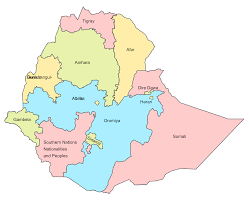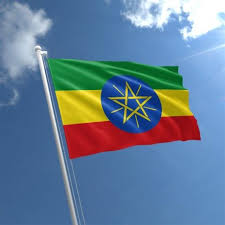 Regions of Ethiopia.
Regions of Ethiopia.
 Comrade Owei Lakemfa.
Comrade Owei Lakemfa.
By Owei Lakemfa
Ethiopia is today, bleeding. It bled yesterday. The day before, it bled. The challenge is how to stop its bleeding, stabilise, and hopefully, stop her from bleeding tomorrow. In the last four decades, it has been engaged in five quite bloody wars; two with Eritrea, one with Somalia over the Ogaden region and two civil wars. The Eritrean War of independence alone, went on for thirty years; September 1, 1961 to May 24, 1991.
Historically, culturally and in terms of tradition and religious practices, no African country is greater than Ethiopia. The country is also one of the two sources of the great Nile River, and an origin of human civilisation. It is the only country in Africa that was never a colony, and has hosted the headquarters of the Organisation of African Union/African Union since its birth on May 25, 1963. Ethiopia, known in ancient times as Abyssinia provided refuge to the earliest Muslims when they faced annihilation in the Arab Peninsula. Prophet Muhammad (SAW) told the Muslims: “If you were to go to Abyssinia (it would be better for you), for the king will not tolerate injustice and it is a friendly country, until such time as Allah shall relieve you from your distress.”

So in 615 AD, the first group of Muslims fled to the Christian Kingdom of Axum (part of modern Ethiopia) and were given shelter by King Ashama ibn Abjar. So Ethiopia was the first country in Africa where Islam took root. This was how Harar, in Eastern Ethiopia came to be regarded as the fourth holy city of Islam after Mecca, Medina and Jerusalem.
The story of the Ethiopian Queen Makeda of Sheba features in the sacred scripts of Judaism and Christianity in which she was reported as visiting King Solomon. Menelik which means “Son of a Wise Man” who founded the Ethiopian Empire in the 10th Century BC, claimed to be the product of the King Solomon – Queen of Sheba relationship.
Also, the encounter between Evangelist Philip and the Ethiopian eunuch featured in the Acts of the Apostles (8: 26-39) where the former famously asked: “Do you understand what you are reading?” The Ethiopian Bible, which is about 800 years older than the King James Version is accepted as the oldest in human history.
Ethiopia was never colonised mainly because its military, led on the battlefield by Queen Etege Tayitu Bitul, wife of Emperor Menelik II in March, 1896 defeated the 20,000 Italian army led by General Baratieri at the famous Battle of Adwa. Although Italy, under Benito Mussolini invaded Ethiopia from 1936-1941, it could neither conquer nor colonise the country.
Despite such a rich and heroic past, Ethiopia easily slides into bloody and avoidable wars partly because those who hold the reins of power at any given time, refuse to run a federal system which is most suitable for a multinational country like Ethiopia with eighty different ethnic groups. Secondly, its attempt to colonise and annex Eritrea led to a long conflict. Thirdly, the country was run as a monarchy for centuries without allowing democratic rights.
Fourthly, the military regimes that ran the country after Emperor Haile Selassie’s overthrow in 1974 were even more autocratic than the monarchs. Fifth, Meles Zenawi who led the coalition of guerrilla movements that removed the military also had an iron grip on power which his successor, Hailemariam Desalegn could not sustain partly because he was from a minority region and had no control over the quite influential army.
Essentially, the Ethiopian political crises stems from its old and shifting power structures which has seen each new power centre imposing its will on others. Ironically, the majority Oromo never came to power until April 2, 2018 when incumbent Prime Minister Abiy Ahmed Ali assumed office. The Ethiopian structure was such that the majority Oromo were suppressed, the Amhara (Amara) which is about half the Oromo population, was the ruling class which also imposed its language as the lingua franca, the Tigrayans who are some six per-cent of the population were the soldiers, the Eritreans were the colonised while other nationalities tried to find their level.
Eritrea was in the 19th Century colonised by the Italians. Britain in 1941 during the Second World War seized it from the Italians. On December 2, 1950, the United Nations removed British control and handed Eritrea to Ethiopia as a trusteeship. Two year later, it passed Resolution 390 making Eritrea a self-governing entity within Ethiopia. The latter simply annexed it. That led to the 30-year war of Eritrean Independence. In 1974, a number of rebel Ethiopian groups including the Tigrayan People’s Liberation Front, TPLF, and the Oromo Liberation Front, OLF, joined the insurgency.
After sixteen years and 1.4 million dead, the rebels defeated the Ethiopian military. Despite this victory, Eritrea refused to remain as part of Ethiopia, opting for independence. That left the minority TPLF as the strongest power in the country. With that, power in Ethiopia shifted from the Amhara ruling class to tiny Tigray. But this was not sustainable as the majority Oromos insisted on free elections and popular democracy which they were sure would take them to power. The Tigrayan hold on power began to loosen after Meles Zenawi died on August 20, 2012.
The rise of Abiy led to a power shift to the majority Oromo. However, the TPLF continued to believe it had enough military strength to check the central government. In September 2020 it defiantly held parliamentary elections which the central government had postponed nationwide due to the COVID-19 pandemic. For inexplicable reasons, the TPLF in November 2020 attacked a federal military formation in the region. The Abiy government sent in federal troops which on November 28, overran the Tigrayan capital, Mekelle. Symbolically, that was where the Ethiopians defeated the Italian military 124 years ago.
What happens next in Ethiopia will depend on how the central government wants to handle its victory in Tigray; will it be magnanimous in victory and pursue reconciliation or vengeance? What is clear to me is that every emergent power majority, creates its own power minorities. The best option for Ethiopia is to run a federal system in which all nationalities, no matter how big or small, will have the right to its own culture, history, language and a sense of belonging to a collective federation where all are born free with equal opportunities and rights. One of the best examples in this is the defunct Soviet Union where a person like Josef Stanlin from tiny Georgia had the right to lead that huge federation.
I wish the leaders of restive countries like Ethiopia and Nigeria will spare time off their very busy schedules to read Stanlin on the National Question.




GIPHY App Key not set. Please check settings